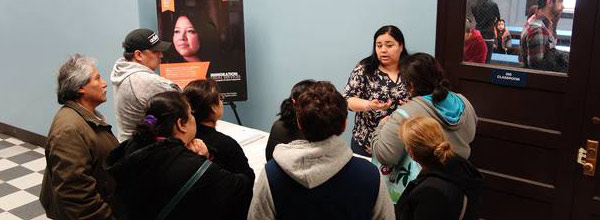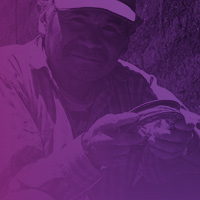Upon taking office, President Trump announced dramatic shifts in federal immigration policies via a series of executive orders. The orders left many in Chicago's immigrant, refugee, Muslim, Middle Eastern, and South Asian communities feeling fearful and apprehensive. Chicago residents and organizations immediately responded, and MacArthur offered financial assistance to help these groups meet the extraordinary demand.
One order temporarily bans foreign nationals from six majority-Muslim population countries from entering the United States. It also dramatically reduces resettlement of refugees into our nation, curbing the longstanding humanitarian tradition of America welcoming those who face persecution in their home countries.
Pending a ruling in its next session, the U.S. Supreme Court will allow this order to be partially implemented—banning certain foreign nationals and refugees who lack ties to the United States from entering the country until the court hears arguments this fall and then rules on the order's legality.
Another executive order drastically changes who the federal government will seek to deport, a policy shift that could have dramatic repercussions in Chicago and our metro area. Rather than prioritize non-citizens with a significant criminal history, the new policy does not require an arrest, much less a conviction, to trigger deportation. It gives federal officials the authority to deport a person believed to have committed a chargeable offense. The extraordinary breadth of the order has had a dramatic effect on our residents and neighborhoods. Immigrants have kept children home from school and curtailed their day-to-day activities out of fear of an immigration raid. In Little Village, where the 26th Street corridor is second only to Michigan Avenue in annual commercial activity, merchants and restaurant owners reported a 40 percent drop in sales in the weeks after the release of this executive order.

The executive orders pledge to punish cities and counties that choose to promote community safety by building relationships with immigrant communities rather than directing local officers to enforce federal immigration law. Local jurisdictions make this choice understanding that police officers who ask residents about their immigration status will erode trust, deter immigrants from reporting and helping to solve crime, and ultimately leave the community less safe.
Some of the policies contained in the executive orders have been implemented; some are currently blocked by the federal courts. Nonetheless, since the executive orders were announced, our communities have responded. Chicagoans are rejecting policies that promote discrimination of Muslim, Middle Eastern, and South Asian Chicagoans; curtail support for our refugee neighbors; and undermine immigrants' faith in public safety officers.
Recognizing the urgency of informing our immigrant neighbors of the potential impact of the orders, immigrant rights and legal aid organizations pulled together to offer workshops on legal rights at home, school, and the workplace. These organizations also help families prepare for the possibility of parents being deported by developing plans for child guardianship.
Because members of some ethnic and national groups have shown great reluctance to expose themselves as undocumented, it is critical for organizations to build trust within their communities. Outreach workers and legal aid providers are developing new and evolving strategies to connect with residents, offering "know your rights" workshops in a variety of languages and with cultural sensitivity.
Organizations are also building alliances across immigrant, ethnic, and religious communities to defend the American values we all hold true: the United States is a nation of immigrants and a nation that protects every person's religious liberty. Recognizing the importance of this work to the city, its diverse communities, and all its residents, MacArthur is bolstering these efforts with grants totaling $1.2 million. Moreover, a core tenet of the Foundation's goal is to support Chicago as a city that offers equitable opportunities to all its residents.
Arab American Action Network, Ethiopian Community Association, Hana Center, Latinos Progresando, and Logan Square Neighborhood Association, among others, received $25,000 each to support outreach and education in immigrant and refugee communities. We also awarded larger grants to expand immigrant legal services and representation for anyone who may face religious or ethnic discrimination; to coordinate with peer organizations around policy and advocacy strategies; and to challenge the legality of these federal laws and policies in the courts whenever necessary to protect the rights and liberties of all Chicagoans.
MacArthur commends the work of residents and organizations to keep Chicago a welcoming and safe community—one in which communities of different ethnicities, races, faiths, and national origins stand together.
These awards do not signify the reinstatement of the Foundation's Migration program, which completed its grantmaking in 2016. Rather, they reflect MacArthur's commitment to support organizations in the greater Chicago area as they protect the rights and liberties of all of our neighbors.





